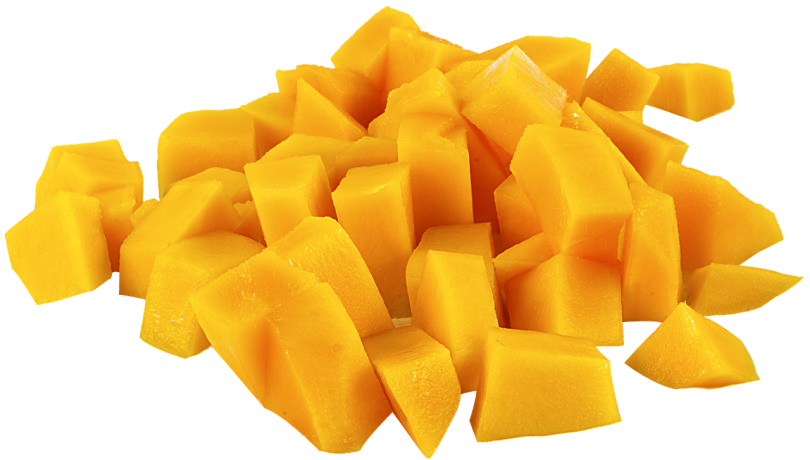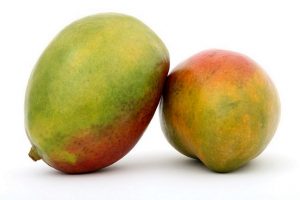Fruit are a joy of summer, and viewed as a delicacy all year round. Fruit is a healthy food that not only tastes good but hydrates you and fills you faster and longer than other foods. Mangoes are known to many as the “king of fruit,” and it is not difficult to see why. With a heavenly, tropical taste, mangoes are also incredibly healthy Tropical fruits may bring upon visions of the tropical jungle and memories from vacations past. Sweet fruits are enjoyed by so many people that we are eager to share the joy of fruits with animals as well.
Nothing beats sliced mango on a hot day, and while you enjoy it so much, many dog owners are asking the same thing: Can dogs eat mango? Is mango good or bad for dogs?
Can dogs eat mango?
The short answer is yes, you may feed your dog some mango if you are inclined. However, there are certain things you should know before feeding them to your canine buddy. Always research the animal in its size and breed when determining if a particular fruit is a good fit. Some animals may not have the tolerance in their digestive system for certain types of fruit. Tropical fruits may also be more inclined to offer an upset stomach since dogs have not evolved to hunt, eat, and digest food that is typically grown in a jungle.
Test the fruit out on your dog before offering a large amount. Having your dog wait a bit of mango at a time will give you the time to watch your dog for any odd behaviors or sickness that could be the result of an allergy or intolerance. If your pup seems to react to mangoes well, up your servings slightly and offer only on occasion.
What should you know about mangoes?
Mangoes have been grown and cultivated in South Asia for thousands of years. Now, the mango is cultivated in most frost-free tropical and warm climates around the world. Interestingly, almost half of the world’s mangoes are cultivated in India, with China being a distant second. While India is the largest producer of mangoes, curiously enough it accounts for less than one percent of the international mango trade as they consume the large majority of their production.
While mangoes are indeed delicious, they are also very healthy! Full of antioxidant compounds, mango consumption can potentially lessen the risk of various types of cancer. Quercetin, gallic acid, astragalin, insoquericetin, fisetin, and methylgallat are some of these compounds. Diets containing foods high in antioxidants, such as those found in mangoes, have been shown to generally improve health.
Those antioxidants, vitamins and minerals within the mango may be wonderful attributes to the human diet, but they also serve as a wonderful addition to the doggie diet as well. The added vitamins may help improve the immune system of your dog as well as the overall health report. Mangoes are also made of water and can aid in the hydration of your dog on a hot day, or add luster and shine to his/her coat. The sweet treat will soon be a favorite of your dog, but be sure to only give in moderation to prevent any potential behavioral issues surrounding food and to prevent sickness.
Health benefits
Mangoes have high levels of pectin, fiber, and vitamin C which all aid in lowering serum cholesterol levels, particularly low-density lipoprotein. Dogs may not be visualized as beings that need to worry about high cholesterol, but the hearts of dogs need to be protected just as the hearts of the owners. Any little bit of vitamin and mineral that can be added to the diet will aid in the cholesterol regulation and health of your pup.
Vitamin A is abundant in the fruit as well. High levels of vitamin A intake encourages strong eyesight and helps in preventing dry eyes and night blindness. Dogs often need to see clearly in the dark. When going outside to use take care of business, or lying awake at night protecting his/her home, night blindness will make the life of a dog very difficult. Protecting the eyes of your dog is always a good thing, and vitamin A may be the key to prevention.
Additionally, mangoes have high levels of malic acid, tartaric acid, and traces of citric acid. These acids help the body more effectively maintain its alkali reserve. Mangoes also help normalize levels of insulin in the body, which is essential in helping treat diabetes. The fruit also benefits from a comparatively low glycemic index, so small quantities will not spike sugar levels. The sweetness of the mango, coupled with the low sugar quantity may trick a dog into thinking he/she is eating a special form of candy, when in fact the mango is more of a sweet vitamin.
Mangoes also contain high levels of fiber, which aid in digestion and elimination. If your dog is having digestive trouble, feeding the doggie mangoes might help in eliminating the problem. Digestion issues also piggyback on overall health issues. If digestion is a problem, there may be a host of underlying issues at hand. If not, the lack of proper digestion itself will bring upon health issues and a lower immune system.
Finally, mangoes have generous amounts of carotenoids and vitamins, all of which aid in keeping an immune system healthy and strong. Having a strong immune system also helps in warding off potential troubles such as cancer, fatigue, and early death.
Feeding mangoes to your dog
Taking into account the delicious taste of the mango and its numerous health benefits, you might find good news in knowing that it is perfectly safe to feed a mango to your dog. Dogs will benefit from the high levels of vitamins and fiber which can strengthen their immune systems and aid in increased levels of digestion and bowel movements, which in turn can improve the overall health of your dog’s digestive system.
However, over consumption of mangoes could potentially give your dog a mild case of diarrhea, but, like most other sweet fruits, this is due to the high levels of sugar consumed. Mangoes also contain high levels of rich proteins that aid in boosting your dog’s immune system and tissue repair. Moderation is the key. Don’t give too much mango to your dog. Once in awhile is fine as a tasty treat.
Things to look out for
Much like peaches, the only dangerous part of a mango is its center pit. Be sure when feeding a mango to your dog that you are completely skinning the mango and removing the pit and disposing of it properly. Additionally, if there is a mango tree on your property, make sure to keep your dog away from any fruits that may have fallen to the ground. A curious dog is likely to eat a mango, pit and all!
Try to keep your mango tree fended or gated if you have a particularly adventurous dog that will eat till his/.her heart is content. If you are unable to put a gate or fence around the tree be sure to simply keep an eye on your dog and try to get their interest on other object sin the yard outside of the mangoes. In the event your dog has eaten a lot of mangoes either from a tree, or from a fruit bowl in the house, be sure to call the vet and ask for directions. Keep an eye on your dog and be prepared for stomach upset.
Mango pits, like the pits of many fruits, contain trace levels of cyanide, an incredibly toxic and poisonous compound that is harmful to both humans and dogs alike. While the pit does not contain a high level of the compound, it is certainly better to be safe than sorry, so make sure you completely get rid of it and dispose it properly. The pit of the mango can also disrupt the inner workings of the dog in and of itself, rather than the toxic additives in the pit.
Keep in mind that the mango pit can also pose a serious choking hazard for your dog. The pit could potentially become lodged in the dog’s windpipe, obstructing the airway and blocking any air from entering or leaving. Additionally, the pit might be swallowed by your dog, which could in turn become lodged in the dog’s digestive system, leading to intestinal inflammation and enteritis. If your dog has swallowed a mango pit, be on the lookout for symptoms such as dizziness, shortness of breath, difficulty of breathing. If you observe these symptoms in your dog, be sure to immediately contact veterinary help.
Mangoes purchased at supermarkets may still have traces of any insecticide or pesticide that might have been sprayed during cultivation, so be sure to thoroughly wash the fruit before feeding it to your dog. These chemicals could potentially harm your dog, or even poison him. You can wash the fruit with warm water and fruit soap, a homemade recipe of soap found online, or a mixture of water and essential oils. The fruit should always be cleaned, cut, and free from pits when given to your dog.
Conclusion
Overall, mangoes are great for your dog! Just make sure to peel the fruit and get rid of the pit and dispose it properly. Be careful of over consumption, intolerance, and a dislike for the fruit. Just like any other treat, however, it should be served in moderation, or you might find yourself with a little mess to clean up! Mangoes are a great treat in the hot summer weather, so why not let your dog in on a little of it!
References:
http://www.dogster.com/lifestyle/can-dogs-eat-fruit
http://www.akc.org/learn/dog-health/fruits-vegetables-dogs-can-and-cant-eat/
http://healthyeating.sfgate.com/benefits-eating-mangoes-4378.html









Leave a Comment